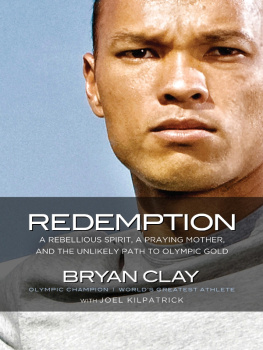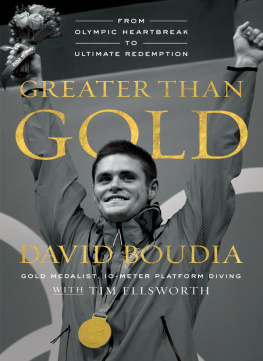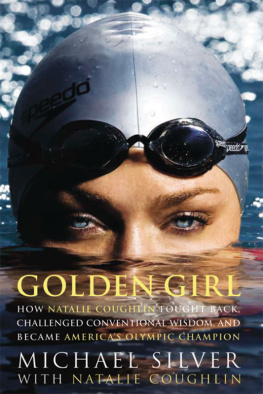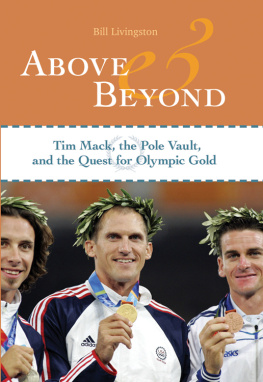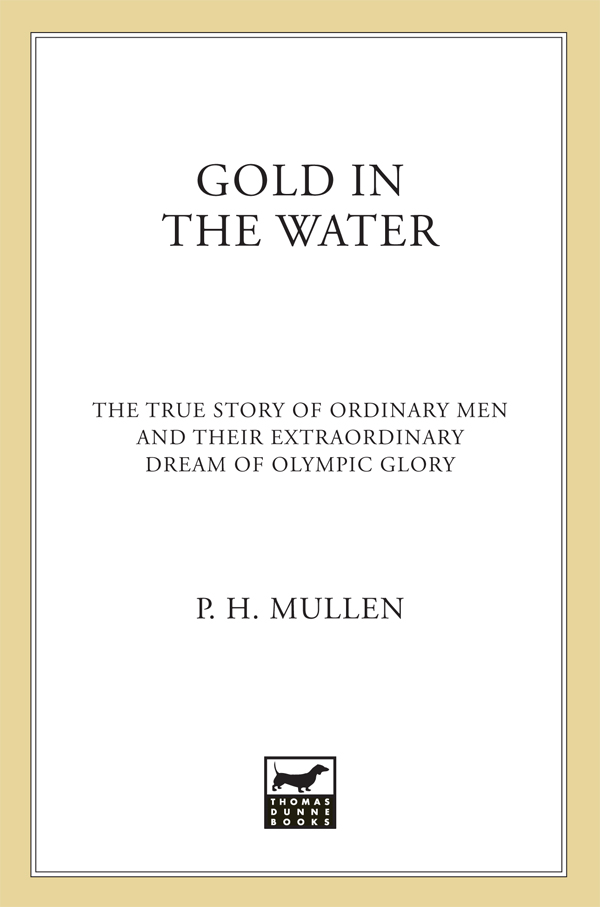Contents
Guide
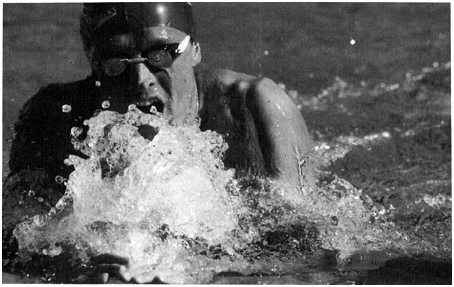

The author and publisher have provided this e-book to you for your personal use only. You may not make this e-book publicly available in any way. Copyright infringement is against the law. If you believe the copy of this e-book you are reading infringes on the authors copyright, please notify the publisher at: us.macmillanusa.com/piracy.
FOR KAREN
I am honored to be in her story.
OLYMPIC ODE I
We may sing of no contest greater than Olympia,
Just as water is the most precious of all the elements,
Just as gold is the most valuable of all goods,
And just as the sun shines brighter than any other star,
So shines Olympia, putting all other games into the shade.
Pindar, c. 500 B.C.
Four laps to go. Four laps to define a place in the world. Four laps to justify an existence.
Moments before the race begins, eight Olympic finalists prepare themselves behind the starting blocks. He stands among them. He stands in front of the world and he empties his body of everything except power. Power and the singular, nonnegotiable passion to touch the wall first.
This is the swimming finals of the 2000 Olympic Games in Sydney, Australia. The air temperature inside the largest natatorium ever built is a constant seventy-nine degrees Fahrenheit. The 18,000 spectators have grown quiet except for various shouts of final encouragement. Frightened birds careen through the rafters. The structure is enormous, a marvel of millennium technology and artistry containing the fastest water in the world. Hundreds of feet separate the liquid from the roofs steel beams and nothing exists between them except passion, hope, and the chance to fulfill a dream.
The eight swimmers behind the starting blocks have each swum more than one million laps to get here. Nearly all Olympic swimmersand the tens of thousands who chased the Olympic dream but fell shorttrain more than a decade to live a moment like this. Their arms have logged nearly enough miles to swim from Sydneys nearby harbor to Los Angelesand back again.
Swimming has a grooved, recognizable order to the start of every race. This is an orderly sport, one full of boundaries and enforced structure. First, the eight finalists will be introduced one by one. And so it happens. When his name is called, he waves to the crowd and then steps out of his sweatsuit and gets down to the business of racing. In swimming, as in many sports, there exists a powerful force that compels athletes to withdraw from the outside world before the battle commences. They zero in, not on their competitors, but on their battlefield. And so these Olympic finalists preparing for the most important race of their lives stare only at the still pool water, which is bubbled upward with the slightest shimmering convexity. Could the water itself be rising to meet its racers? It seems so. When you are a swimmer standing behind a starting block, what you see is the black line on the pools bottom that runs down the middle of your lane. Through the water, it appears jagged, like a lightning bolt, which is exactly how you feel. This line becomes a focus point. Here at the Olympics, the water explodes with the reflected light from tens of thousand of camera flashes.
The finalists adjust and readjust their goggles; they swing their arms in fast circles and jump explosively upward. They adjust their goggles again, taking care to press the hard plastic into their eye sockets to create a watertight seal. Standing among them, he exhales mightily until his head faintly spins and all the carbon dioxide has cleared his lungs. The others do the same. Their movements have become specific and ritualized over the years. In the big picture, isnt that what all of sport is? Ritual, specificity, and hungry want? And in turn, isnt that what defines the human experience? We watch sports because within their careful choreography and their constant pursuit of perfection there will forever exist endless variation, chance, struggle, and the slightest imperfection. It is in these variables that we find the drama, and the drama is why we watch.
He shakes his hands as if throwing off water. He jiggles his long, hammocked triceps. These unconscious moves are intended to loosen the muscles although all they really do is release nervous energy. Several other swimmers heave their shoulders and then slowly roll them backward as if shrugging off overcoats. He scowls at the pool. In this, the 2000 Olympic finals, there is only one goal on everyones mind: to move through the cool, blue water one-hundredth of a second faster than anyone else in the world.
Swimmers, step up to the blocks.
On the starting blocks, the athletes needlessly press and repress their goggles yet again. The craving for simple reassurances. The swimmers set their feet. Their starter is a man with a tan and creased face, and he announces the event in a voice that is authoritarian and slightly tinny. The sound of it echoes through the natatorium and the spectators fall silent. Now the voice turns quiet to speak directly to the competitors. Theres a rounded softness to the words, a sense of grandfatherly intimacy. The swimmers hear whats said through the small, waterproof speakers embedded beneath every block. The voice says:
Judges and timers, ready.
There is a suspended silence that lasts about two seconds. Just enough time to laser-focus on the race. Or just enough time to falter and become undone.
* * *
By now we know the 2000 Summer Olympic Games were the most successful in history. We know the Olympic swimming competition will probably go down as one of the greatest swim meets of all time. Fourteen world records and fifteen U.S. national records were set. It was a wonderful story. But this book is not about that story, at least not at first. The Olympic Games serve as this books final exclamation point, its rousing inflection at the end of a two-year journey. In the twenty-four months that precede every Olympics, legions of swimmers all over the world stop their lives to train for the opportunity to represent their country in the Olympiad. Their passionate quest is the greatest singular goal in individual sports. It is a hard and solitary journey. But it is also noble. It is noble because one of the most important things to do in life is at least once chase a dream with every ounce of power and conviction we can muster. That dream-chasing is what this book is about. Its also about the dreaming itself, about the quest for immortality, and the failures and triumphs that occur along the way. These mostly anonymous athletes spend their whole lives backseating friends, social life, academics, and normal adolescence for the chance to chase this dream. They must first reach the national level and then the international level. They wait their entire lives for the chance to pursue greatness and then they embark upon it. This book is a record of one groups journey.
At the storied Santa Clara Swim Club in northern California, a corps of two dozen American swimmers, one of the largest elite groups in the country, made a run at Olympus and immortality. Long ago, the Santa Clara Swim Club had been the center of the swimming universe. But by the time these individuals began training there in the late 1990s, it was a tired institution trying to reclaim any measure of its fabled past. That, too, must be part of this story, for while America is the land of opportunity, it is also the land of reinvention and improbable resurrection. Some of the Santa Clara group gave up nothing more than a summer to train. But others gave up everythingschool, home, work, and loveto swim inexorably and unwaveringly toward their common goal.



